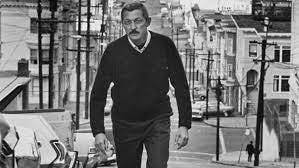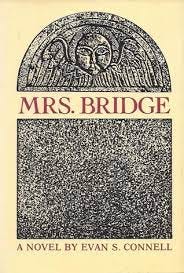“Mrs. Bridge said it was just the way she liked it.”
Insufferable people — the ones we pretend not to see on the street, the ones whose calls we silence and whose voicemails (why in God’s name do they insist on leaving voicemails?) we avoid listening to — undergo a peculiar transformation when they become characters in a book: they become not just tolerable but delightful. Mickey Sabbath? Come right in. Dr. Cottard? Could I sit at his table?
One of the most delightful insufferables in fiction is Wilhelm Van Metre, a minor character in Evan S. Connell’s Mrs. Bridge. He’s a pompous, pontificating bore with a rumbling voice, terrible taste in restaurants, and an inability to drive at more than fifteen miles per hour. He drops by unannounced and stays for three time-distending hours. “I seem to be having some slight difficulty with my vocal apparatus,” he says after clearing his throat. I wish he were the star of a ten-book series.
Instead he’s granted fewer than a dozen pages — but those pages distill the mysterious brilliance of this short, astonishing novel. Mrs. Bridge is, for those lucky enough to still have a first reading to look forward to, the story of a profoundly ordinary housewife in 1930’s Kansas City, Missouri. A lesser writer might have written the book as a condescending and overfamiliar satire (Has anybody noticed that the suburbs, despite their outward gleam, can actually be a bit stultifying?). Connell did it as a quietly shattering, unaccountably hilarious elegy.
The book is a portrait in shards — 117 chapters, most of them no more than a page. Each one shimmers like a Zen story — the fable of the guest towels that must never be touched; the koan of Mrs. Bridges’ terror of being observed while parallel parking. The book makes you laugh until you cry — not in the usual sense of laughter crescendoing in tears, but in the sense of distinct emotional events: you’re laughing and then, without quite knowing why, you’re crying. No scene puts me through this emotional wringer more reliably than the Bridges’ dinner out with the Van Metres.
The Van Metres are an older couple with whom the Bridges find themselves trapped in a cycle of reciprocal dinner invitations (“…once you accepted an invitation you were obligated to reciprocate, or, as Mr. Bridge had once expressed it, retaliate.”) The Van Metres insist on hosting the Bridges at their grim and semi-moribund country club.
“It seems,” Van Metre chuckled, “we have the place to ourselves this evening.”
“I do get so sick of crowds sometimes,” Mrs. Bridge answered brightly.
This is the first step in the dance that characterizes every interaction between the Bridges and the Van Metres. Wilhelm steps on Mrs. Bridge’s toes and Mrs. Bridge (despite the absence of an apology, or even acknowledgment) insists that she doesn’t mind.
“What a lovely view,” Mrs. Bridge exclaimed.
“I’m afraid you’re being kind,” Van Metre said, unfolding his napkin. “There isn’t much to look at.” He began to frown in the direction of the kitchen.
The first thing I love about these interactions is the precision of Connell’s ear. It’s one thing (and not a small one) to master the instrument of a particular character’s voice. But it’s another to learn how to play that instrument in all its different registers. This is, distinctly, Mrs. Bridge when she’s in social agony and desperate not to show it. You can all but hear the rigidity of her smile.
But what I love even more is the subtlety of the dynamic here being taxonomized. The Bridges hate the country club and so talk it up; the Van Metres love the club and so talk it down. Reading this feels like seeing a startlingly accurate impersonation for the first time — the real phenomenon, in all its ridiculousness and poignancy, only becomes visible, somehow, in its passage into art.
Eventually Van Metre orders roast beef for the entire table, and then settles in to tell what can generously be called a story.
“Possibly I have told you of my experience in Illinois last summer on the way home from my annual fishing trip.”
“Why, no, I don’t believe you have,” Mrs. Bridge said attentively. “What happened?”
Barely anything happened, it turned out. But that doesn’t stop Van Metre from recounting it in great detail — or from reprimanding Mrs. Bridge’s repeated chipper attempts at assuring him that he isn’t being nearly as boring as he most certainly is. By the time we arrive at the story’s “punchline” (“’Well sir,’ Van Metre said, leaning back in his chair and all at once slapping the table, ‘that was the finest martini I ever tasted,’”) we feel that we, along with Mrs. Bridge, have survived an ordeal.
But there’s no time to celebrate, because the food is here — and with it, the end of the chapter.
“ ‘This beef isn’t quite done,’ Van Metre observed.
Mrs. Bridge said it was just the way she liked it.
This ending, for me, has the satisfactions of a religious ritual — Mrs. Bridge’s insistent agreeability serves her like a clutched cross. If she were to run to the bathroom with sudden food poisoning, she would say that that too was precisely what she’d been hoping for. She doesn’t so much interact with the Van Metres as she wades through them, like a nun through skid row, holding her composure strenuously aloft — and here she finally emerges on the other side.
But the end of a chapter — especially a short chapter — imposes a kind of silence, and in this particular silence I feel, once the laughter has dissipated, a rising uneasiness. Because Mrs. Bridge has, once again, outlasted the Van Metres. But she isn’t, once she’s back in the privacy of the car with Mr. Bridge, going to unleash a string of relieved curses and incredulous laughter. She’s going to discern what Mr. Bridge wants (silence? a neck massage?) and then do her best to supply it. And when they get home, she’ll do the same with their kids. For Mrs. Bridge, it’s rigid smiles all the way down.
And this is why Mrs. Bridge, for all its delights, is one of the saddest books I’ve ever read. She’s a woman whose preferences — whose pleasures — have slipped so far down her list of priorities that she’s all but lost touch with them. A successful day for her is one in which all the difficult and demanding people with whom she’s surrounded are alright. That she might not be alright — that she might have an opinion about the doneness of the roast beef, or even about her dinner plans — would never occur to her.
The first time I read Mrs. Bridge the suffering of its protagonist — while poignant — seemed distinctly over there. It was about a middle-aged homemaker of my grandmother’s generation. I nodded respectfully and moved along.
Now, though — as a middle aged person, as a parent — its implications have crept terrifyingly close. To have a child, to become an adult, is to acquire a heap of needs and vulnerabilities — a jumble of joys and burdens, hopes and anxieties — beneath which your own desires, whatever they were, can barely be glimpsed. What once read to me like satire now reads to me like journalism. Of course Mrs. Bridge is too busy monitoring the wellbeing of her dinner companions to taste her food. And of course that’s just the way she likes it.




I managed to find an old, damaged soft-cover copy of "Mrs. Bridge" in the SC state lending system, and just finished the read this afternoon. While I didn't find it *quite* as humorous, it was engrossing, and took precedence over the other 2 books I started. Loved the format of sometimes ultra short chapters. I'm not sure why, perhaps its slyness, but it reminded me of a very favorite book: "The Debt to Pleasure", by John Lanchester. I have lost count of the books that I've read because of your recommendations now, and hope my requests are either puzzling or amusing someone in the library system. Looking forward to the New Year and more adventures in reading.